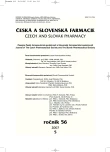-
Medical journals
- Career
Abiotic elicitation of Trifolium pratense L. Suspension culture
Authors: M. Kašparová; T. Siatka; J. Dušek
Authors‘ workplace: Charles University in Prague, Faculty of Pharmacy in Hradec Králové, Department of Pharmacognosy
Published in: Čes. slov. Farm., 2007; 56, 225-229
Category: Original Articles
Overview
Important substances of secondary metabolism include flavonoids and isoflavonoids. The Trifolium pratense L. (Fabacae) suspension culture is characterized by low production of these metabolites and therefore we tried to influence the production output with elicitation. From their origin point of view, the elicitors are divided into two groups – biotic and abiotic. The latter group includes, for instance, the salts of heavy metals. Our work was aimed at observing the effect of the copper sulphate abiotic elicitor on the production of the Trifolium pratense L. suspension culture (variety DO-8 and variety DO-9) that was cultivated in Gamborg media supplemented with 2 mg.l⁻¹ of 2,4-dichlorophenoxyacetic acid and 2 mg.l⁻¹ of 6-benzylaminopurine. The maximum increase in the flavonoid production took place, when compared with the test check, during the 168-hour application of the 100 μmol concentration.
The DO-8 variety isoflavonoids production was stimulated namely during the 48-hour application of the 1 μmol concentration; the best elicitation effect of the DO-9 variety was achieved with the 168-hour application of the 10 μmol concentration.Key words:
Trifolium pratense L. suspension culture – flavonoids and isoflavonoids – abiotic elicitation – heavy metals
Labels
Pharmacy Clinical pharmacology
Article was published inCzech and Slovak Pharmacy

2007 Issue 5-
All articles in this issue
- Oxidative stress and its role in respiratory diseases
- Cytochrome P450 3A polymorphism and its importance in cyclosporine and tacrolimus therapy in transplanted patients
- Abiotic elicitation of Trifolium pratense L. Suspension culture
- Effect of vanadium compounds on the growth and production of coumarins in the suspension culture of Angelica archangelica L.
- Effect of thermal curing of the ethyl cellulose film on the rapidity of release of diclofenac sodium from pellets
- Mucoadhesive tablets for oral administration of ciclopiroxolamine
- Determination of valproic acid by on-line coupled capillary isotachophoresis with capillary zone electrophoresis with conductometric detection
- Czech and Slovak Pharmacy
- Journal archive
- Current issue
- Online only
- About the journal
Most read in this issue- Mucoadhesive tablets for oral administration of ciclopiroxolamine
- Oxidative stress and its role in respiratory diseases
- Cytochrome P450 3A polymorphism and its importance in cyclosporine and tacrolimus therapy in transplanted patients
- Determination of valproic acid by on-line coupled capillary isotachophoresis with capillary zone electrophoresis with conductometric detection
Login#ADS_BOTTOM_SCRIPTS#Forgotten passwordEnter the email address that you registered with. We will send you instructions on how to set a new password.
- Career

